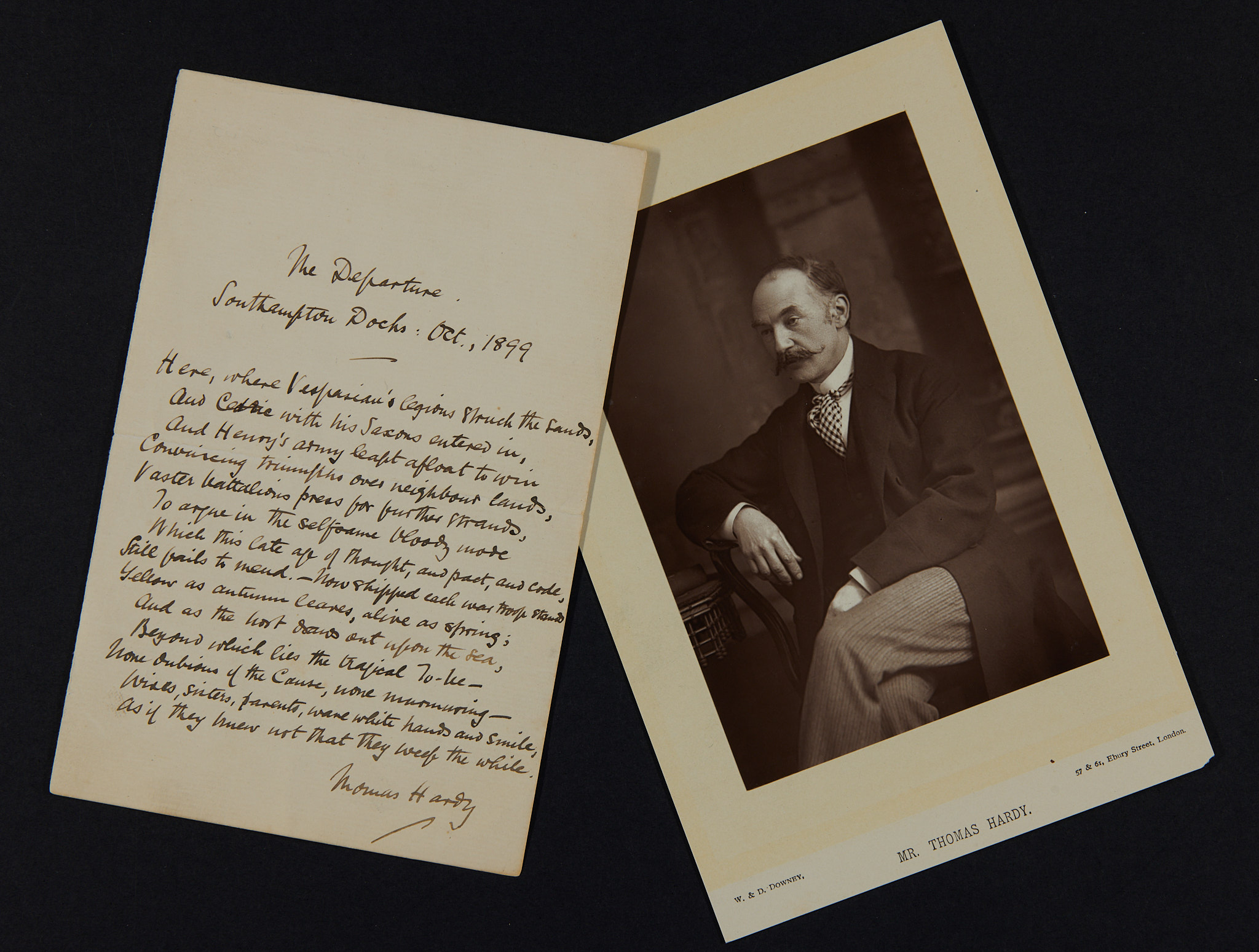Dorset History Centre (DHC) has successfully acquired a poem by author Thomas Hardy which is believed to have been held in America since 2005. ‘The Departure’ was sold that year at Sotheby’s in London. It next appeared at an antiquarian dealership in Massachusetts where it was purchased by an American collector in 2014.
More recently, the poem then appeared at auction in Chicago in June 2024. DHC was able to bid for the poem with generous support from the Friends of the National Libraries who funded the acquisition. After nearly 20 years overseas, we are pleased to report that this fascinating piece of literary heritage is now safely back in Dorchester where it will remain as part of the larger Hardy archive, currently being catalogued in a project that will open up public access.

The full text of the poem reads:
The Departure
(Southampton Docks: 1899)
Here, where Vespasian’s legions struck the sands
And Cedric with his Saxons entered in,
And Henry’s army leapt afloat to win
Convincing triumphs over neighbour lands,
Vaster battalions press for further strands,
To argue in the selfsame bloody mode
Which this late age of thought, and pact, and code,
Still fails to mend. – Now deckward tramp the bands,
Yellow as autumn leaves, alive as spring;
And as each host draws out upon the sea
Beyond which lies the tragical To-be,
None dubious of the cause, none murmuring,
Wives, sisters, parents, wave white hands and smile,
As if they knew not that they weep the while.
‘The Departure’ was one of a number of poems written by Thomas Hardy following a visit to Southampton Docks in October 1899 to watch the departure of troops to the Boer War. It was first published in the Daily Chronicle on 25 October 1899, and later included in his Poems of Past and Present (1902), where it appeared under a changed title with several amendments. The manuscript recently acquired by DHC is a fair copy of the original version of the poem as it appeared in the Daily Chronicle.
In Poems of Past and Present, ‘The Departure’ became ‘Embarcation’. Hardy amended the eighth line of the sonnet from ‘Still fails to mend. – Now shipped each war troop stands’, to ‘Still fails to mend – Now deckward tramp the bands’. He also made a minor alteration to line ten from ‘as the host’ to ‘as each host’. The title ‘Departure’ was given to another of Hardy’s poems in Poems of Past and Present. This poem begins ‘While the far farewell music thins and fails.’
DHC holds several other items which relate to this manuscript. One is a letter from Thomas Hardy to Florence Henniker written on 9 November 1899, in which he questions her response to the poem.
“I fancy you thought my sonnet on the departure too tragic? But I was not at Southampton on the Saturday when you were there – I went Friday, and saw of 5000 altogether.”
The same letter also refers to the events behind another poem for which DHC holds a manuscript copy in Thomas Hardy’s hand. ‘The Going of the Battery’, was written after Hardy witnessed the departure from Dorchester of the Battery of Artillery stationed in the town. He wrote,
“[a]s they left at 10 at night, and some at 4 in the morning, amid rain and wind, the scene was a pathetic one.”
The grisly events of the Boer War had clearly made a strong impression on Hardy as he watched thousands of troops leaving for foreign shores.
DHC is delighted to have been able to bring this notable piece of Dorset literary heritage back to its place of origin. The story perhaps underlines just how much of our literary and other heritage has been sold to oversees institutions and collectors – and how fortunate we are to have been able to reintegrate it into the large Hardy archive to ensure free ongoing public access.


A fascinating story, about a poem I’d never heard of. Thanks for achieving its return, and including details here.
I am aware of another poem written by Hardy concerning a departure. This was on the occasion of the departure of the SS Aquitania on a goodwill visit by a deputation from the town council of Weymouth England in 1926 to Weymouth Massachussetts on the occasion of its quatercentennary. I can’t find a copy of the poem although I seem to remember having seem it at one time as my grandfather was one of the councillors.